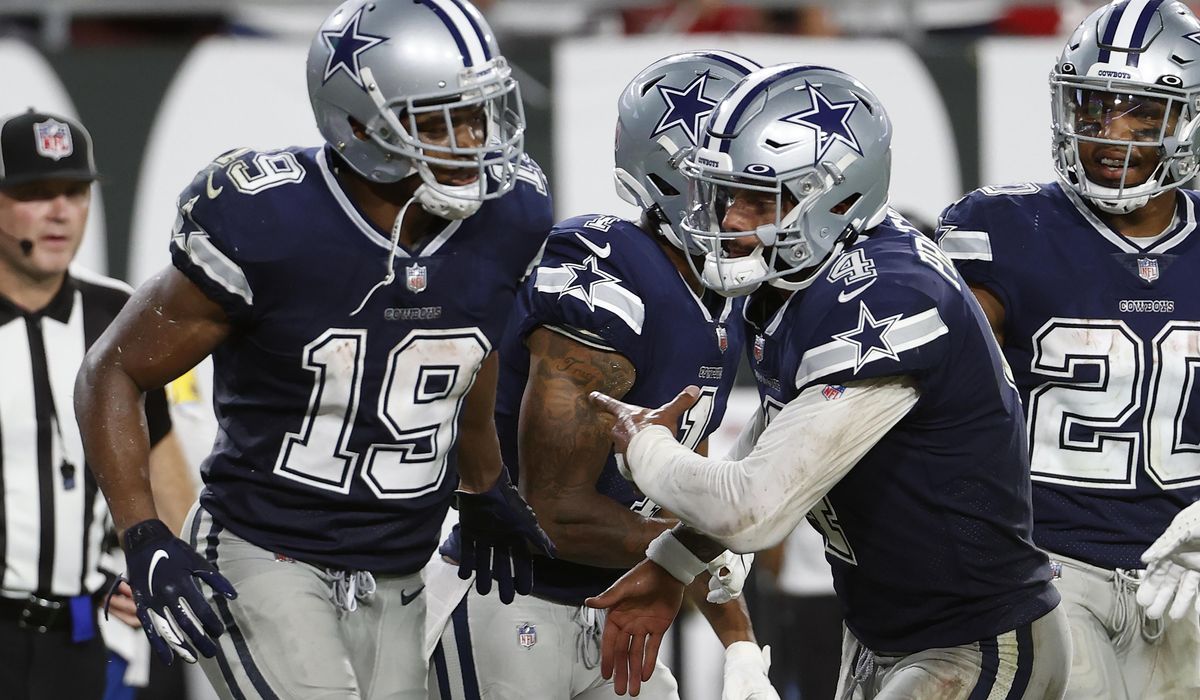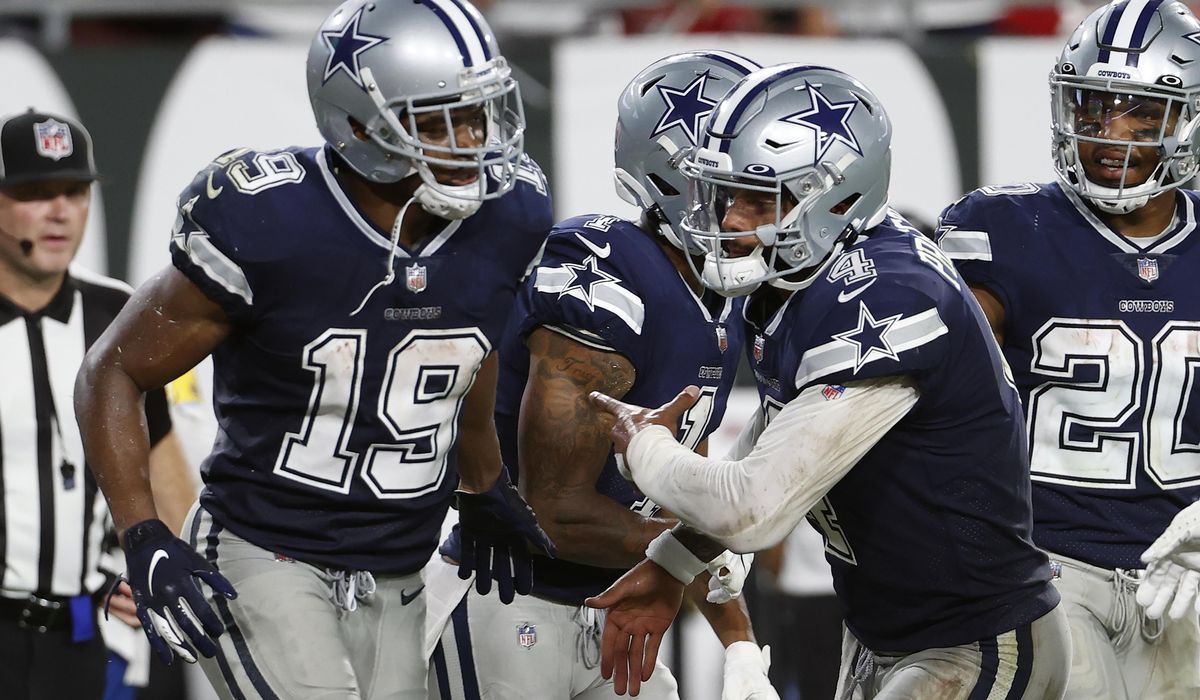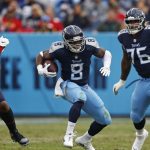
Yes, more important battles than the fight over who should be allowed to play football are taking place in the national debate over vaccines — from the president asking the courts again Tuesday to reinstate a shot mandate, to service members seeking exemptions, to families deciding who gets to come to Thanksgiving dinner.
But this country is still football-crazy. And the vaccine argument is suddenly heating up in the NFL.
The Dallas Cowboys, who face the Las Vegas Raiders Thursday, go into the traditional Thanksgiving Day game without their top receiver in Amari Cooper — who already missed Sunday’s loss against the Kansas City Chiefs after testing positive for COVID-19.
As an unvaccinated player, Cooper must miss at least 10 days following a positive test because of NFL protocols — which differentiate the procedures for when vaccinated and unvaccinated players can return. And since the Cowboys are on a short week, the four-time Pro Bowler had no shot at playing on the holiday classic under the league’s guidelines.
Teammates are sticking by Cooper’s right to refuse the shot, but some fans, including ex-players, are livid.
“I’m absolutely hot about it,” Hall of Fame wide receiver Michael Irvin told TMZ Sports. “Are you joking? …. I got a guy (in Cooper) who makes $21 million (per year) on the bench, at home, not playing. It’s crazy. Our job as athletes is to try to remove any reason of not winning the Super Bowl. … You have to try to mitigate any issue that can cost you a game or a Super Bowl. And COVID is one of them.
“You go get vaccinated to try to mitigate it, best you can. Now, you can still get it even after you get vaccinated, but it’s a different percentage, or chance, of you getting it.”
A source with knowledge of the NFL’s testing procedures told The Washington Times that unvaccinated players this season are testing at a rate two times higher than vaccinated individuals. The league said that rate was as high as seven times back in August, but it has since gone down. According to the NFL, 94.3% of players are vaccinated. Players who don’t show proof of vaccination to the NFL are allowed to keep playing but must submit to more rigorous testing.
From Aug. 1 through Nov. 13, 128 players and 232 personnel — made up of executives, coaches and staff members — have tested positive for the virus.
In the two weeks before Nov. 13, 20,353 tests were administered to a total of 6,518 players and team personnel.
Dr. Allen Sills, the league’s chief medical officer, told the NFL Network recently that 20% of vaccinated players were returning from the league’s COVID-19 reserve list sooner than the 10-day window that unvaccinated players must abide by. Under the league’s protocols, vaccinated players can return to play as soon as they pass two COVID-19 tests within 24 hours and are medically cleared.
The doctor said vaccinated players have “shorter duration of illness” and milder cases, allowing them to get out of quarantine.
“As a total number we have more cases among vaccinated, just because we have so many more vaccinated people,” Dr. Sills said. “But I’ll point out that unvaccinated players have consistently tested positive at a much higher rate than vaccinated players have.”
Cowboys quarterback Dak Prescott defended Cooper — “my brother,” he said — in his post-game press conference.
“It’s unfortunate not having him,” Prescott said. “But to say ‘The decision he made?’ I mean, me, I’m vaccinated, I can get it and be out two games. So let’s not try to knock the guy or put the guy down for a personal decision.”
Cooper isn’t the only unvaccinated player under scrutiny.
Green Bay’s Aaron Rodgers faced similar criticism when he was forced to sit out Nov. 7’s loss to the Kansas City Chiefs. One of the league’s biggest stars, Rodgers is one of several quarterbacks who have passed up the chance to get the vaccine. Minnesota’s Kirk Cousins and Indianapolis’ Carson Wentz are unvaccinated, and in August, a Michigan hospital Cousins partnered with cut ties with the quarterback over his vaccine stance.
This month, Rodgers pushed back against criticism that he mislead people over his vaccination status. The Packers quarterback initially told reporters over the summer that he was “immunized,” but reports revealed Rodgers was unvaccinated following a positive test.
In an appearance on the “Pat McAfee Show,” Rodgers accused the media of conducting a “witch hunt” by asking players if they were vaccinated. Rodgers said he was allergic to an ingredient in two of the three vaccines — the mRNA vaccines produced by Pfizer and Moderna — and was concerned about getting the Johnson & Johnson shot due to potential side effects. He repeated a debunked claim that the vaccine could cause fertility problems.
“I believe strongly in bodily autonomy and the ability to make choices for your body, not to have to acquiesce to some sort of woke culture or crazed individuals who say you have to do something,” Rodgers said.
It’s not just football players who refuse to get the shot, either. The NHL gave Evander Kane a 21-game suspension for submitting a fake vaccination card to the league.
In the NBA, the Brooklyn Nets asked star Kyrie Irving to not be part of their team if he wasn’t going to comply with a local mandate that required all New York-based athletes to have the vaccine in order to play in home games.
Irving hasn’t taken the kind of public stand that Rodgers did. Irving instead asked people, at least initially, to respect his privacy.
But after a report came out that said Irving, citing sources close to him, wants to be a “voice for the voiceless” by refusing the vaccine, the NBA guard faced widespread backlash. ESPN’s Stephen A. Smith said Irving’s reported reasoning was “the stupidest thing that I think I have encountered with an NBA player.”
TNT’s Charles Barkley said Irving had a responsibility to not get the vaccine for himself, but for others.
“You get vaccinated for your family first,” Mr. Barkley said. “You get vaccinated for your teammates second.”
That idea — getting the vaccine for others — was also brought when Rodgers was criticized.
“I respect his attitude toward being an individual, but this is a team game,” Hall of Fame coach Jimmy Johnson said on Fox. “In all honesty, I’m disappointed in his play on words for his explanation. I’m disappointed in some of his selfish actions.”







